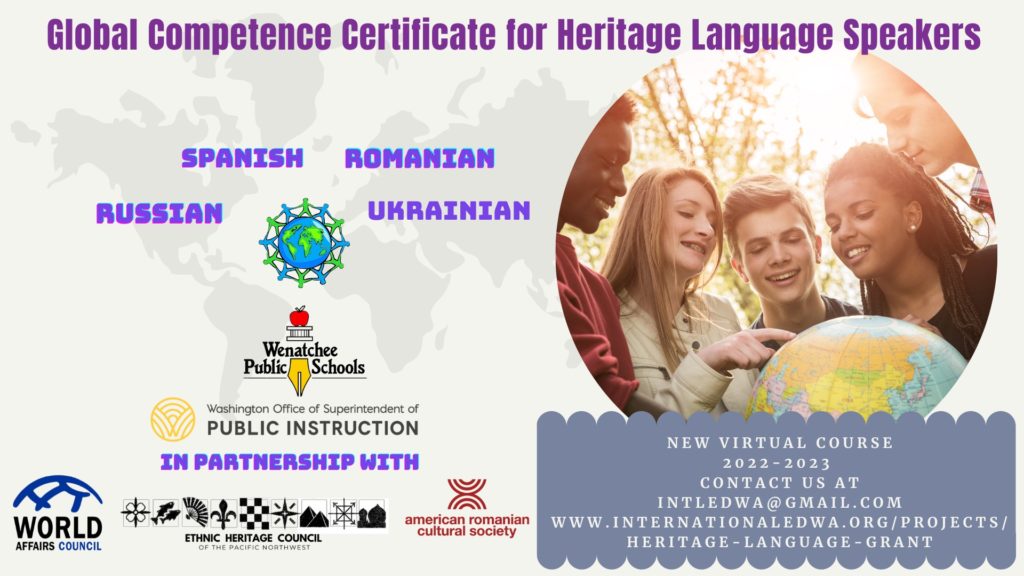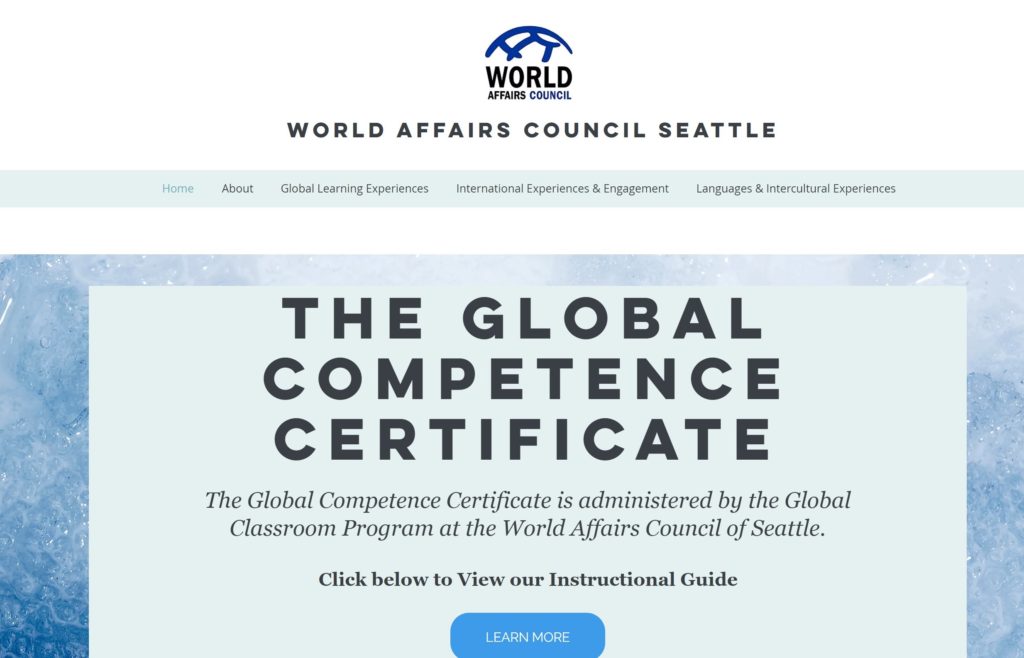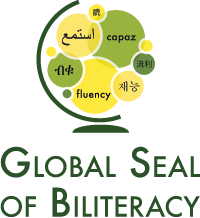
Students:
You can develop your language proficiency and literacy in your Heritage Language while also preparing a portfolio for the Global Competence Certificate in the Heritage Language through the World Affairs Council in Seattle. Upon completion of the program, you will also have the opportunity to complete World Language Competency-Based Credit testing to earn high school credits in your language and potentially qualify for the Washington State Seal of Biliteracy. You may also qualify for the Global Seal of Biliteracy https://theglobalseal.com/.
What’s this all about?
Q: What is the Global Competence Certificate? Why should I want to earn it?
A: The Global Competence Certificate is offered in Washington state by the World Affairs Council. We are one of a number of states offering this type of Global Education recognition, but we are the only state on the West coast AND the only state offering it in a multilingual format. We want to recognize students who have demonstrated that they are globally competent, namely, that they understand and are ready to engage with today’s interconnected world.

Here are some key reasons why global competence matters:
Global competence is necessary for employability in the global economy.
Global competence is necessary for living cooperatively in multicultural communities.
Global competence is necessary for young people to communicate and learn effectively and responsibly.
Global competence is necessary for achieving the United Nations’ Sustainable Development Goals.
http://globaledcertificate.org/about/ accessed 10/22/2020
Learn more and watch a brief video at What is Global Competence?
Q: Will the Global Competence Certificate appear on my high school transcript?
A: No, it will not appear on your high school transcript because it is not awarded by the state or district. It’s awarded by a non-profit organization, the World Affairs Council. However, you should list it on your resume and on college and job applications. It will definitely make you stand out. (Who knows? Maybe you’d even like to write your college admissions essay about how you earned the Global Competence Certificate and got to know your family origins better than you ever expected.)
Q: What is the Seal of Biliteracy? Does it appear on my transcript?
A: The Seal of Biliteracy is a recognition that students can earn by demonstrating proficiency, including the ability to read and write, in two languages. In Washington, the State Seal of Biliteracy is available to any public high school student who can demonstrate the approved proficiency level in a language other than English and satisfy high school graduation requirements for English. Students can test in their language from grades 9-12 (sometimes grade 8), but they can’t actually “earn” the State Seal of Biliteracy until they graduate high school. Upon graduation, it will be noted on your high school transcript that you earned the State Seal of Biliteracy in your language. (However, you should still call it out in your resume and college and job applications; people might not look that closely at your transcript.) You can learn all about it at the State Office of Superintendent of Public Instruction website.
Q: What is World Language Competency-Based Credit testing?
A: Students who know a language other than English can take an approved assessment to show what level of proficiency they can demonstrate across skills (reading/writing, listening/speaking) in that language. Based on the overall level of proficiency, they may qualify for 1, 2, 3, or 4 high school world language competency-based credits. If the district has put in place the proper policy and procedure, those credits can be added to the student’s high school transcript (which means they can be used to satisfy college admissions requirements too). If the student qualified for 4 comp credits (overall Intermediate Mid proficiency), then they also qualify as proficient for the State Seal of Biliteracy in that language. As indicated above, earning the State Seal of Biliteracy would be added to the transcript upon high school graduation.
Students in our Heritage Language Grant program will be tested, and the program will share the results with the student’s school and district (unless the student asks us not to share them). We expect that the students will be able to earn high school world language competency-based credits for Romanian, Russian, or Spanish based on our program (unless their district has not adopted the policy and procedure for competency-based testing).
Q: What is the Global Seal of Biliteracy? And how is it different from the State Seal?
A: The language proficiency tests that we’ll use for students to earn world language competency-based credits and qualify for the State Seal of Biliteracy can also be used to qualify students for the new Global Seal of Biliteracy.

The Global Seal of Biliteracy is a credential that celebrates language skills and expands future opportunities for its recipients. A uniformed standard is used to empower our awardees to be a valuable asset in multilingual environments. We are committed to providing access to language certification to anyone that can demonstrate their bilingualism via testing. The Global Seal of Biliteracy enables recipients to showcase their language skills to any school or employer across state lines and national borders, with a unique serial-numbered document.
https://theglobalseal.com/ accessed 10/22/2020
The Global Seal is a great complement to the State Seal of Biliteracy and it has several advantages:
- Students can earn the Global Seal of Biliteracy before high school graduation. That means you can add it to your college and job applications even before you graduate high school. That may open some doors to you even as a teenager.
- The Global Seal of Biliteracy recognizes multiple levels of proficiency. The Functional Fluency (Intermediate Mid) level is the same as our Washington State Seal of Biliteracy. However, many Heritage Language Users can reach Working Fluency (Advanced Low). We hope that students in our program will aim for that level.
- The Global Seal of Biliteracy offers the option of earning college credits. For a relatively small fee and brief reflection writing assignment, students earning the Global Seal of Biliteracy can also get actual college transferable credits.
Q: Does the Global Competence Certificate portfolio have to be a website? Does it have to be public? Do I have to make a video presentation of it?
A: Yes. The portfolio is presented as a website that you, the student, design and create yourself. (Of course, we’ll provide help and guidance along the way.) There are many free website builders you can use. Here’s an example site you can look at.
No. You do not have to make the website public. You can control access to it by how you “share” it. You will need to share it with your teachers and teaching assistants in the program and our World Affairs Council reviewers (in order for them to evaluate it and award you the Global Competence Certificate). But, after that, you don’t have to share it. Of course, we hope you’ll want to share it with your family and close friends, especially if you have relatives elsewhere in the world. To earn the Global Competence Certificate, you’ll need to present it to our team. If we can’t meet in person, then you can do it via Zoom. However, you do not have to make a recording (video) of your presentation. YOU are the owner of your Global Competence Certificate portfolio website.
Q: What will the program schedule look like?
A: We are still working on the details, but here is an approximate schedule:
- Classes will meet via Zoom about once a week for 1 hour, most likely late afternoon or evening so that we don’t conflict with the school day.
- Students will work on their own on projects about 2-4 hours/week.
- Teachers and tutors will offer office hours each week for students who want to connect and talk or ask questions.
- The World Affairs Council will offer additional interesting opportunities, such as interviews, global issues programs, language group meetings, and other activities several times a month.
- The program this year will run from September 2022 through June 2023.
Q: Do I have to travel to do the Global Competence Certificate?
A: No, you do not, especially while COVID-19 is still a big challenge in our communities. You may be wondering about the International Engagement component of the Global Competence Certificate. There are some tips for Getting Started with International Engagement that you may find helpful.
For International Engagement, students will be asked to reflect on their experiences engaging with diverse cultures and communities. These reflections might be from traveling abroad, studying a language, doing service work, or engaging in international exchange. A student might also reflect on an international engagement experience here in Washington. That could be called a “glocal” (global/local) experience. But now, during the COVID-19 pandemic, we may be limited in visiting even our local communities in person. However, we can visit many places here and around the world virtually through technology without even leaving home. Check out Getting Started with International Engagement.
More questions? Send them to intledwa@gmail.com. (You can also write them in Romanian, Russian, or Spanish.)